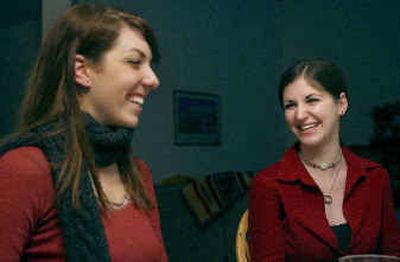Students back from Germany exchange

Anna Markley found it’s tough to navigate a bicycle through traffic with a bassoon strapped on her back. “I knocked over a couple of flower pots, but I put them back. I don’t think anyone noticed,” she says.
And Kasey O’Brien learned it’s potentially awkward to date if you don’t know local customs: “He got serious in a hurry, when all I wanted was to have someone to hang out with. When I broke off with him, our relationship became really strained.”
The 17-year-old high school seniors – Anna, from Lake City, and Kasey, of Post Falls – are recounting their adventures during their yearlong stay in Germany under the Congress-Bundestag Youth Exchange Program.
The North Idaho teens were two of the four Idahoans selected for the program last year. They joined 246 other young men and women from across the United States who lived with host families and studied in German schools from July 2003 through June 2004.
The U.S. Congress and its German counterpart have funded the exchange program each year since 1983 to provide all-expense-paid learning experiences to an equal number of students from each country.
Anna and Kasey had played volleyball together in the ninth grade but weren’t close friends. Each learned about the program independently, Kasey from her mom, who teaches at North Idaho College, and Anna from an Internet search.
They had to meet academic requirements, write five short essays dealing with their lifestyles, family traditions and extracurricular activities, then submit themselves for oral interviews in Boise with 12 other finalists.
Kasey had studied French for two years, and Anna had studied German, but she didn’t consider herself fluent before they flew to Germany for a three-week language camp.
Then, they were dispatched to their host families. Anna lived in Tuttlingen, a town of some 36,000 in southern Germany, about an hour by road from Zurich, Switzerland.
Kasey’s German home was in Herten, population about 70,000, on the Rhine River near Belgium and Holland.
“I thought I had the basics of the language down, but in my first days of school, I didn’t understand a thing. It was real scary,” says Kasey.
The family she stayed with included a girl of the same age and a boy two years younger. The youths and Kasey’s host mother and father spoke only German at home and, with her total immersion in the language at school, “I picked it up pretty fast, and by seven or eight months I was dreaming in German,” she says.
Anna wasn’t so lucky. Her host family of a mother, father, three girls and a boy spoke English at home and, she says, “The worst problem I had during the year was expressing myself.”
But all their fellow students had studied English for eight years, so conversing with them was relatively easy, they say.
Both teens took full college-prep course loads, including physics, chemistry, biology, French, mathematics, history, geology and art, plus physical education and English.
“When it came time for English, the teacher more or less turned the class over to me,” Kasey says. “She’d ask if she was using the right word, if she was pronouncing it right. And at parties, the kids like to show off their English”
The teens are hard-pressed to say what the favorite part of their experience was: “We loved it all, and the food was incredibly good” says Anna.
But travel is near the top of their lists: Anna skied in Switzerland and Austria, cruised French canals on a houseboat, and visited the Netherlands and Belgium, all with her host family.
And Kasey’s travels, also with her hosts, took her “all over Europe,” she says.
None of their schoolmates had cars, and their host families’ autos are smaller than American counterparts. Some of their friends had mopeds, but like most of their schoolmates, both teens relied heavily on bikes, public transport and, says Anna, “bumming rides.”
They note their German peers can legally smoke and drink wine and beer at age 16. Another difference they encountered is that females are not as liberated as they are here: “Nearly all the boys in my school will go on to college,” Kasey says. “But the girls plan to become housewives.”
Both teens say American people are liked and our culture is admired and even emulated – “The writing on their T-shirts and sweatshirts is all in English,” says Anna – but our government is looked down upon, in large part because of our activities in Iraq, the girls say.
And, they say, their German friends are somewhat critical of most Americans’ insularity.
They both observed some prejudice, especially against Turkish residents, and East Germans also were looked down upon because of their relatively poor economy and lack of progress.
Most Germans they encountered were sensitive about the Nazi era, according to the girls, but many own the movie “Schindler’s List.” “And they’re convinced it’s a German film,” says Kasey.
Now back home, the teens are making up for classes they missed during their German sojourn. Anna is taking nine classes at Lake City while most of her friends, she says, have about five.
And Kasey is enrolled in two Post Falls High classes plus three at North Idaho College, “catching up on subjects like U.S. history and economics,” she explains.
Both highly recommend the exchange program. Anna says, “I’m a lot more outgoing than I was, and I have a better understanding of the world and a larger interest in politics.”
And Kasey says she’s “made friends that I’ll have forever.”